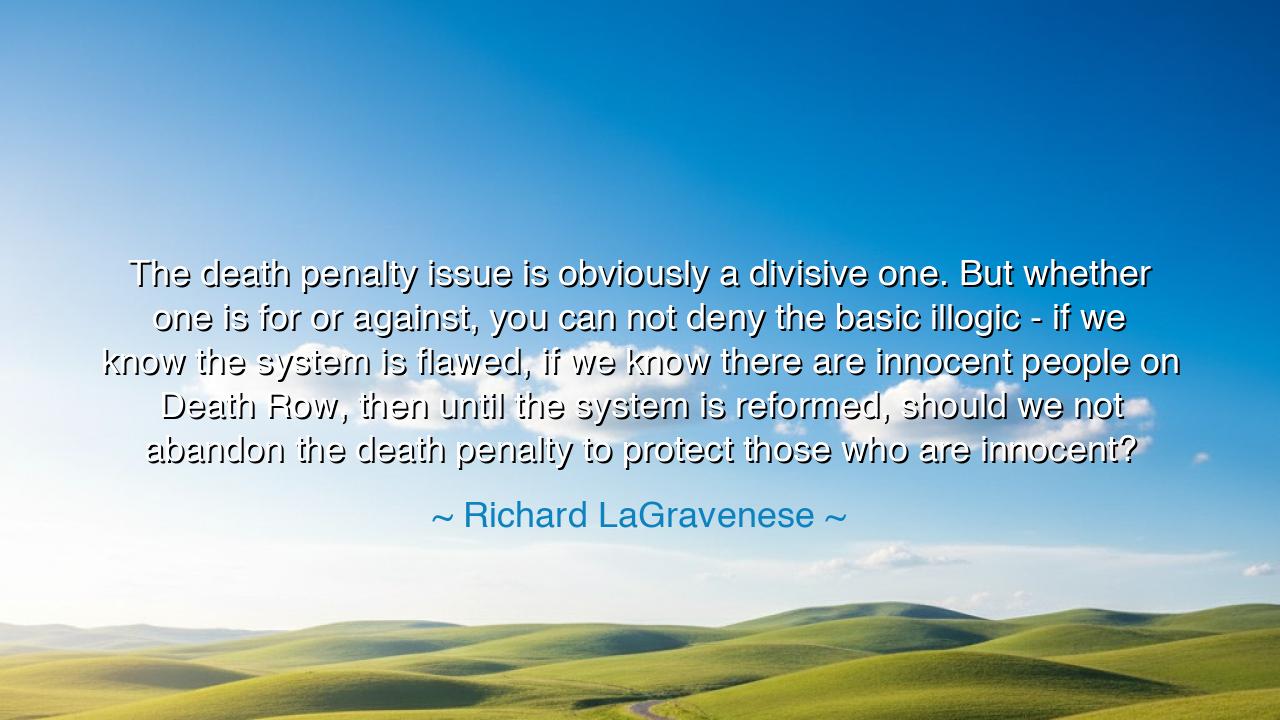
The death penalty issue is obviously a divisive one. But whether
The death penalty issue is obviously a divisive one. But whether one is for or against, you can not deny the basic illogic - if we know the system is flawed, if we know there are innocent people on Death Row, then until the system is reformed, should we not abandon the death penalty to protect those who are innocent?






“The death penalty issue is obviously a divisive one. But whether one is for or against, you cannot deny the basic illogic—if we know the system is flawed, if we know there are innocent people on Death Row, then until the system is reformed, should we not abandon the death penalty to protect those who are innocent?” Thus spoke Richard LaGravenese, the storyteller and screenwriter who, through his art, has long explored the complexities of the human soul. In these words, he gives voice not to passion alone, but to reason touched with compassion — a call for justice that is tempered by wisdom. His statement rises beyond politics and sentiment, reaching instead into the moral heart of humanity: the question of whether we have the right to destroy life when our own instruments of judgment are broken.
Since the dawn of civilization, justice has walked a fragile path between righteousness and cruelty. The ancient laws — from the Code of Hammurabi to the decrees of the Roman Senate — declared that the wicked must die to preserve order. Yet the wise among them, the philosophers and prophets, warned that the greatest danger to any society lies not in its criminals, but in its errors. To take a life wrongly, they said, is to wound the soul of the nation itself. LaGravenese echoes that timeless warning: when the system is flawed, justice becomes blind not to fairness, but to truth, and in that blindness, even the innocent are devoured.
The heart of LaGravenese’s argument is not merely moral — it is logical. He does not demand that one be for or against the death penalty, but asks all to confront the contradiction that lies within its practice. If a system admits imperfection, and if imperfection leads even once to the killing of an innocent, how can such a system claim moral legitimacy? To proceed with executions despite such knowledge is not justice; it is pride. It is to place human judgment above mercy, and to make final that which should remain uncertain. His words pierce the conscience like a sword of reason, for they remind us that logic itself rebels against vengeance built on the sands of doubt.
History bears witness to the tragedy of this truth. Consider the story of George Stinney Jr., a fourteen-year-old boy executed in South Carolina in 1944. He was accused, tried, and condemned in a single day, his small frame so slight that the electric chair’s straps hung loose upon him. Decades later, his name was cleared — too late, for the innocent had already died. Stinney’s case is not alone; it is a symbol of the countless unseen errors of human law. To remember such stories is to see that LaGravenese’s words are not theory but warning — that a justice system capable of taking the innocent is not justice at all, but tragedy dressed in legal robes.
And yet, LaGravenese does not preach despair. His question, though sharp, carries hope — the hope that humanity can reform, that systems can change, that conscience can awaken. To abandon the death penalty until justice is purified is not weakness, but strength — for restraint is the highest mark of wisdom. The ancient kings who showed mercy were not lesser rulers; they were greater, for they understood that power over life is the most sacred and dangerous power of all. To hold it lightly, or to set it down until it can be borne rightly, is not cowardice — it is the beginning of enlightenment.
But there is a deeper lesson still: that the protection of the innocent is not only the duty of courts and governments, but of every human heart. We are each the stewards of justice in the small arenas of our own lives. When we rush to condemn others, when we believe rumor over truth, when we let anger rule judgment, we practice the same blindness that destroys the innocent on a larger scale. To seek truth before punishment, understanding before wrath — this is the beginning of a just and humane soul.
Lesson: Let LaGravenese’s words remind us that true justice is never hasty, never proud, never blind to its own imperfections. Before we destroy, we must first ensure that we understand; before we judge, we must be certain that we are right. And when certainty cannot be found — when even the shadow of doubt falls upon the condemned — mercy must rise. For mercy is not weakness, but the wisdom of those who have looked upon the frailty of human reason and chosen love over arrogance.
So, live and judge as the ancients counseled — with compassion in one hand and humility in the other. Remember that to protect the innocent, even one among many, is to preserve the light of humanity itself. For a civilization that values life above punishment, truth above vengeance, and mercy above pride is a civilization that walks, however slowly, toward justice worthy of the divine.






AAdministratorAdministrator
Welcome, honored guests. Please leave a comment, we will respond soon